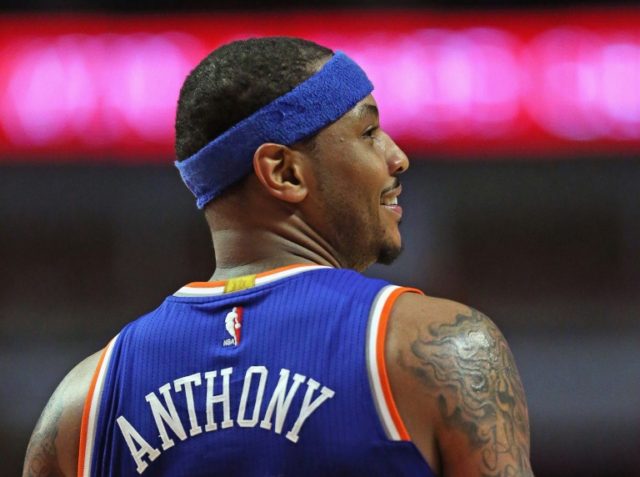ESPN’s Howard Bryant interviewed New York Knicks star Carmelo Anthony about the only subject that concerns them, sports.
Just kidding. They talked about race, and how racist everything is.
Bryant began the interview, which runs in the October 31st issue of ESPN The Magazine’s “NBA Preview Issue” by prompting Melo to discuss his favorite subject. How America is basically no better today than in the days of Bull Connor:
HOWARD BRYANT: It sounds like there’s a sort of tipping point that’s happening around the country. When I talk to younger people, they have this attitude like, “We’re supposed to be past this. This is why I’m upset.” And then I talk to my uncles and they’re like, “See, this is how it is. This is nothing new.”
CARMELO ANTHONY: This is the new ’60s right here. Everybody I talk to, my mom and uncles and friends, they say the same thing. They’re like, “What you’re seeing right now, we’d seen it already. It’s new to you, but it’s not new to us.” I think it’s bigger and much deeper than just actually seeing what’s happening out there. Not just police brutality but so many other issues out there that are being swept under the rug. Our educational system is messed up. Schools are closing left and right.
Yes, other than having a black president, no segregation, no draft, and not a single governor standing in a schoolhouse door to prevent black students from entering, nothing has changed since the ’60s. Bryant continued:
HB: What you’re touching on is the one part of this that’s been really difficult for me and people wanting to talk about Colin Kaepernick. They’re not focusing on why he’s doing what he’s doing. They look at Baltimore and they’re not looking at the fabric of Baltimore. You have no parks. You’ve got no infrastructure. What do you expect that to look like if you’re taking all the resources out of the community?
CA: When you don’t have resources, it becomes hopeless. There’s nothing to look forward to. I know when I was coming up, it was after-school. We had rec centers to go to in our neighborhoods. We had parks to go play in. We had football fields to go to. You had different things that you could go do. I always find it fascinating when I go back to my community and kids that I have known, or their parents, just hearing them talk. The one thing I get out of it is they just want a voice. They just want to be heard. It’s like, “We want everybody to hear us.”
Baltimore, where Carmelo Anthony grew up, makes the top five in per pupil education spending. New York, where Anthony currently lives and plays basketball, places first. Kind of strange for a guy whose home and adopted home both fall in the top five in per pupil education spending, to making the “lack of resources” case, isn’t it?
The strangeness did not end there, however:
HB: When you talk about this, you’re not really talking about police brutality specifically. You keep saying, “The system is broken.”
CA: The system is broken. It trickles down. It’s the education. You’ve got to be educated to know how to deal with police. The police have to be educated on how to deal with people. The system has to put the right police in the right situations. Like, you can’t put white police in the ‘hood. You just can’t do that. They don’t know how to react. They don’t know how to respond to those different situations. They’ve never been around that, you know? When I was growing up, we knew police by their first name. We gave them the nicknames. But that’s only because we related. And when the white police came into our neighborhood, the black police said, “Yo, we got this.” That doesn’t happen anymore. You got black police afraid to go into black communities now, and the white police are like, “Shit, I’ll come. It’s a job. I’ll go in there and do it.” Not knowing what’s going to happen.
So, the entire problem comes down to white cops who don’t know how to respond to situations in “the hood?” A rather startling statement from Anthony, considering that he cites, in this same article, the death of Baltimore resident Freddie Gray as one of the pivotal incidents that compelled him to speak out.
Why is that startling? Because three of the six cops arrested after Gray’s death were black. By Anthony’s logic, Freddie Gray would still be alive today because the black cops on the scene would have told the out-of-their-element white cops, “Yo, we got this.”
Instead, they contributed to everything that went on that night. No evidence exists, nationally, that diverse police departments improve community relations with minorities.
For those of you who enjoy pain, you can read the rest of this tripe here.

COMMENTS
Please let us know if you're having issues with commenting.